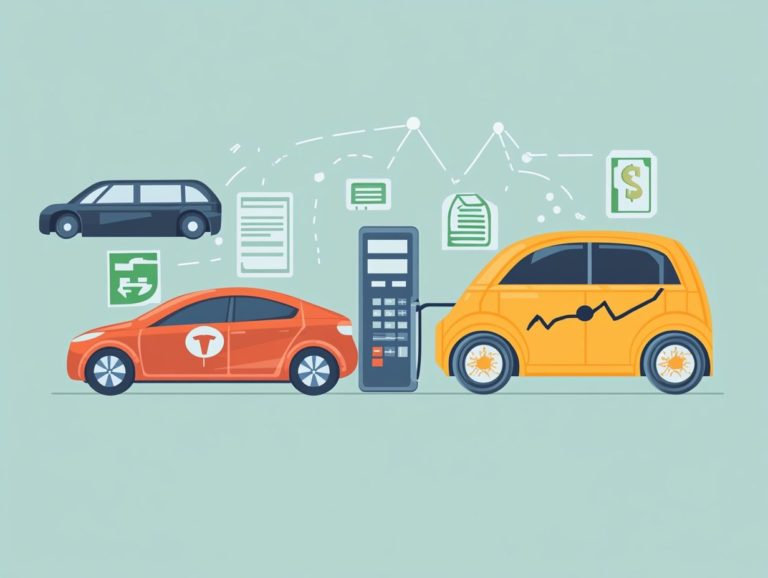exploring tax benefits for ev fleet owners
As electric vehicles (EVs) continue to transform the transportation landscape, you may find yourself considering the shift to an EV fleet for your business. This transition not only aligns with your sustainability goals but also brings a wealth of financial advantages.
You ll discover a range of tax incentives available to EV fleet owners, including enticing federal tax credits and various state-specific programs. By using these benefits, you can save substantially on fuel and maintenance costs while positively impacting carbon emissions.
We ll also delve into the necessary documentation to help you maximize these advantages.
While the transition to electric vehicles may present some challenges, you ll discover exciting solutions to ensure a seamless move. Embrace the opportunity to drive your fleet into the future and capitalize on these advancements!
Contents
- Key Takeaways:
- Tax Benefits for EV Fleet Owners
- Other Financial Benefits
- Reduced Carbon Emissions
- How to Take Advantage of Tax Benefits
- Requirements and Documentation
- Challenges and Considerations
- Frequently Asked Questions
- What are the tax benefits for EV fleet owners?
- What federal tax credits are available for EV fleet owners?
- Are there any state-specific tax incentives for EV fleet owners?
- Can EV fleet owners deduct the cost of EV charging stations on their taxes?
- Are there any tax deductions available for EV fleet owners?
- Do tax benefits for EV fleet owners expire?
- Tax Benefits for EV Fleet Owners
Key Takeaways:

- Transitioning to an EV fleet can bring significant benefits, such as tax credits and incentives from both federal and local levels.
- In addition to tax benefits, EV fleet owners can also save on fuel and maintenance costs while reducing carbon emissions, making it a financially and environmentally sound choice.
- To take advantage of tax benefits, EV fleet owners must fulfill certain requirements and provide proper documentation.
- It is important to consider potential limitations and find suitable solutions.
What is an EV Fleet?
An EV fleet refers to a group of electric vehicles (EVs) that you can utilize for various business tasks, from delivering goods to transporting staff. Making the shift to electric vehicles not only modernizes your fleet management but also supports sustainability initiatives, as these eco-friendly vehicles significantly reduce carbon emissions.
With the rapid advancements in EV technology and growing government incentives, many businesses like yours are investing in commercial clean vehicles, enhancing both operational efficiency and environmental stewardship.
A well-rounded EV fleet typically includes a variety of electric vehicles, such as vans, trucks, and passenger cars, each tailored to fulfill specific roles within your organization. Registered dealers are essential in this journey; they help you acquire the latest models that align with your operational requirements.
Effective fleet management software can optimize your routes and track vehicle performance, boosting productivity while reinforcing your sustainability efforts. As more companies recognize the advantages of adopting EVs, they not only help create a cleaner environment but also enjoy significant cost savings on fuel and maintenance.
Benefits of Transitioning to EVs
Transitioning to electric vehicles (EVs) brings a wealth of benefits, including financial savings, enhanced efficiency, and a strong commitment to sustainability.
When you adopt EVs, you can tap into tax credits and state incentives that significantly lower the purchase price of both light-duty and commercial clean vehicles. Investing in EV charging infrastructure ensures that your vehicles are always ready to roll, leading to optimized fleet management and reduced operational costs in the long run.
The environmental advantages are impressive; switching to EVs can lead to a substantial decrease in carbon emissions, promoting cleaner air and easing the strain on fossil fuel resources. You ll also enjoy lower maintenance costs, as EVs have fewer moving parts compared to traditional vehicles. This enhanced efficiency means longer intervals between services, allowing you to allocate resources more effectively.
By embracing electric mobility, you elevate your corporate social responsibility profile and position yourself advantageously in a rapidly evolving market that increasingly values sustainability.
Tax Benefits for EV Fleet Owners
For you as an EV fleet owner, understanding tax deductions for EV purchases is crucial for optimizing your investment in electric vehicles.
The vehicle tax credit, accessible through the IRS under the Inflation Reduction Act, presents remarkable savings opportunities for both personal and commercial clean vehicles.
You should also explore the eligibility requirements and the potential to transfer credits, as this can considerably alleviate the financial strain linked to transitioning to EVs while enhancing the overall profitability of your fleet.
Wondering how you can save money? Explore the wide range of incentives available for your business and consider making the switch to an EV fleet today!
Federal Tax Credits
Federal tax credits for electric vehicles (EVs) are pivotal in encouraging fleet owners like you to embrace clean vehicles. Thanks to the latest IRS guidelines, you can now claim a vehicle tax credit for qualifying electric vehicles purchased after the Inflation Reduction Act was enacted.
This credit varies based on the purchase price and vehicle specifications, offering you a valuable financial incentive to transition your fleet toward greener options. Your eligibility for these credits depends on several factors, including the vehicle type and weight class, which is particularly relevant for fleet operations that often utilize larger vehicles.
To navigate the application process smoothly, gather all necessary documentation like receipts and proof of vehicle specifications to streamline your claims. The financial impact of these credits can be significant, allowing you to reduce overall operational costs while paving the way for long-term sustainability initiatives.
This boosts your company s eco-friendliness and positions you as a leader in sustainability!
State and Local Incentives
In addition to federal tax credits, state and local governments offer a variety of incentives that can greatly benefit electric vehicle (EV) fleet owners. These state tax incentives can vary significantly, with places like California, New York, and Colorado leading the charge with targeted programs designed to encourage the adoption of commercial clean vehicles.
Take California, for example; it boasts an impressive array of rebates through the Clean Vehicle Rebate Project, which can help cut upfront costs of purchasing electric fleets. Similarly, New York’s Drive Clean Rebate offers a financial advantage.
Colorado s EV Infrastructure Grant Program helps set up necessary charging stations, making the transition even smoother for fleet owners. States like Washington and Massachusetts also provide tax credits and financial incentives for expanding EV charging networks.
These initiatives not only reduce your operational costs but also foster a more sustainable future by boosting electric vehicle adoption. Embracing these local initiatives could be a game changer for both your business and the environment.
Other Financial Benefits

Transitioning to an electric vehicle (EV) fleet offers more than just tax benefits; it unlocks considerable financial advantages that can enhance your bottom line.
You will likely experience significant savings on fuel and maintenance costs, as electric vehicles typically require less frequent servicing than traditional counterparts. This translates to lower operational expenses.
Investing in EV charging infrastructure simplifies management and ensures your commercial fleet remains consistently operational. It plays a vital role in reducing carbon emissions.
Savings on Fuel and Maintenance Costs
One of the most compelling reasons to embrace electric vehicles (EVs) is the substantial savings on fuel and maintenance costs. With gasoline and diesel prices on the rise, EVs present an economical alternative that drastically cuts down on fuel expenses.
You’ll find that they typically have fewer moving parts than traditional vehicles, translating to lower maintenance costs and less frequent service visits. As an EV owner, you could save anywhere from $800 to $1,200 annually just on fuel, depending on your electricity rates and driving habits.
Studies reveal that charging an electric car costs approximately half as much per mile as fueling a gasoline vehicle. Regarding maintenance, EVs require significantly less upkeep; say goodbye to oil changes and enjoy the fact that their brake systems often last longer due to a feature called regenerative braking, which uses the vehicle’s movement to recharge the battery.
With fewer than 20 moving parts in an electric motor compared to over 200 in a conventional engine, it s clear that these vehicles offer remarkable long-term cost benefits for drivers like you.
Reduced Carbon Emissions
Switching to electric vehicles (EVs) greatly impacts the environment. It mainly reduces carbon emissions.
By choosing electric vehicles over traditional gasoline-powered ones, you contribute to cleaner air and a smaller carbon footprint.
As businesses increasingly embrace sustainability, adopting clean vehicles is a vital step in enhancing their environmental profile and ensuring compliance with regulations.
Using renewable energy sources for charging can significantly cut down on the total pollution caused by EVs, which aligns your efforts with global initiatives to combat climate change. With advancements in technology, battery efficiency continues to improve, leading to longer ranges and shorter charging times. This encourages higher adoption rates.
This transition not only reduces harmful pollutants that cause respiratory issues but also supports the development of green infrastructure. By prioritizing electric vehicle usage, your organization sets a strong example, inspiring consumers and industries to reflect on their roles in building a sustainable future.
How to Take Advantage of Tax Benefits
To maximize the tax benefits of electric vehicles (EVs), you need to understand the requirements and documentation necessary to claim these valuable credits.
The IRS has specific eligibility criteria for the vehicle tax credit. Ensuring compliance with these standards is vital for claiming these financial incentives.
Careful record-keeping is essential, as it serves as proof of purchase and eligibility for the credits.
Requirements and Documentation
Claiming the vehicle tax credit for electric vehicles (EVs) involves specific requirements and documentation set by the IRS. To qualify, ensure that your vehicles meet the criteria outlined in the Inflation Reduction Act, considering factors like purchase price and specifications.
Keep detailed records of the purchase and any relevant expenses to support your claims during tax assessments.
If you want to benefit from these credits, maintain an organized file of invoices, receipts, and the vehicle identification number (VIN) for each EV you purchase. Review IRS Form 8936, designed for electric vehicle credits, and ensure every field is filled out accurately.
Understanding the tax code can greatly affect your overall tax liability. Consulting with a tax professional can be invaluable in navigating the complexities of claiming these benefits. It’s also important to stay updated on changes to tax laws and eligibility criteria, as these updates can impact your current claims and future purchases.
Challenges and Considerations
Transitioning to an electric vehicle (EV) fleet offers many benefits, but as a fleet owner, you must navigate various challenges and limitations.
The installation of EV charging infrastructure and the upfront costs of acquiring commercial clean vehicles can be barriers to adoption.
However, by understanding these challenges and exploring viable solutions, you can successfully integrate EVs into your operations while maintaining efficiency.
Possible Limitations and Solutions

As a fleet owner transitioning to electric vehicles (EVs), you might encounter some common hurdles. These include costs involved and the limited availability of charging stations.
Additionally, high initial costs are needed for infrastructure development. Various solutions are emerging, including partnerships with charging network providers and tapping into government grants designed to ease these financial burdens.
By recognizing these limitations and proactively seeking solutions, you can make your transition to electric vehicles seamless and efficient!
You might also find yourself concerned about the range of electric vehicles, which can impact your operational efficiency. Compatibility issues with existing logistics systems that favor traditional fuel sources could further complicate matters.
To tackle these challenges, consider engaging with technology providers that offer specialized solutions to monitor vehicle performance and optimize routing. This ultimately enhances efficiency.
Participating in educational workshops tailored for fleet management teams can also be beneficial. These workshops foster awareness of EV advantages and best operational practices. By leveraging these strategies, you can navigate the complexities of electrification with greater ease and confidence.
Frequently Asked Questions
What are the tax benefits for EV fleet owners?
EV fleet owners are eligible for several tax benefits for electric vehicle buyers, including federal tax credits, state tax incentives, and other tax deductions. These benefits can help offset the initial costs of purchasing and operating an EV fleet.
What federal tax credits are available for EV fleet owners?
Federal tax credits are available for EV fleet owners through the Section 179D deduction and the Alternative Fuel Infrastructure Tax Credit. The Section 179D deduction allows for a tax deduction of up to $1.80 per square foot for investments in energy-efficient commercial buildings. The Alternative Fuel Infrastructure Tax Credit provides a tax credit of up to 30% for the installation of EV charging stations.
Are there any state-specific tax incentives for EV fleet owners?
Yes, many states offer tax incentives for EV fleet owners, such as tax credits, rebates, and exemptions. For example, California offers a tax credit of up to $5,000 for businesses that purchase or lease new EVs. To maximize your benefits, it’s important to research the benefits of EV tax credits in your state and take full advantage of available tax benefits.
Can EV fleet owners deduct the cost of EV charging stations on their taxes?
Yes, EV fleet owners can deduct the cost of EV charging stations as a business expense. This includes both the initial cost of the charging station and any installation fees.
Are there any tax deductions available for EV fleet owners?
Besides federal tax credits, EV fleet owners may also be eligible for tax deductions such as the Qualified Business Income Deduction and the Work Opportunity Tax Credit. Additionally, understanding what you need to know about EV tax policy is crucial. It’s important to consult with a tax professional to determine which deductions apply to your specific situation.
Do tax benefits for EV fleet owners expire?
It’s essential to stay informed about expiration dates and changes in tax regulations. For more detailed information, consider consulting a tax professional or visiting relevant government websites.
Tax Benefits for EV Fleet Owners
Some tax benefits for EV fleet owners have expiration dates. For instance, the federal Alternative Fuel Infrastructure Tax Credit expired at the end of 2021, highlighting the importance of understanding electric vehicle tax incentives.
Many states offer tax incentives for EV fleet owners, including tax credits, rebates, and exemptions. In California, businesses can receive a tax credit of up to $5,000 for purchasing or leasing new EVs.
EV fleet owners can deduct the cost of EV charging stations as a business expense. This deduction covers both the purchase price and any installation fees.
In addition to federal tax credits, owners might qualify for other deductions like the Qualified Business Income Deduction and the Work Opportunity Tax Credit. It s wise to consult a tax professional to see which deductions apply to you.







